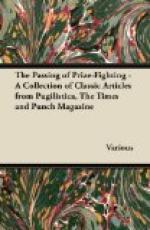He hadn’t meant to intrude, he twittered; Peter had brought him; it was Peter’s fault; Peter was very eccentric.
Peter, I gathered, was the fat cob, who by this time had butted into the lines and was tearing at a hay net as if he hadn’t had a meal for years.
His alleged master looked at me hopeless, helpless. What was he to do? “Well, since Peter is evidently stopping to tea with my horses,” said I, “the only thing you can do is to come to tea with us.” So I lifted him down and bore him off to the cow-shed inhabited by our mess at the time and regaled him on chlorinated Mazawattee, marmalade and dog biscuit. An hour later, Peter willing, he left us.
We saw a lot of the Padre after that. Peter, it appeared, had taken quite a fancy to us and frequently brought him round to meals. The Padre had no word of say in the matter. He confessed that, when he embarked upon Peter in the morning, he had not the vaguest idea where mid-day would find him. Nothing but the black cob’s fortunate rule of going home to supper saved the Padre from being posted as a deserter.
He had an uneasy feeling that Peter would one day suddenly sicken of the war and that he would find himself in Paris or on the Riviera. We had an uneasy feeling that Peter would one day develop a curiosity as to the Bosch horse rations, and stroll across the line, and we should lose the Padre, a thing we could ill afford to do, for by this time he had taken us under his wing spiritually and bodily. On Sundays he would appear in our midst dragging a folding harmonium and hold Church Parade, leading the hymns in his twittering bird-like voice.
Then the spinster ladies of his old parish of Thorpington Parva gave him a Ford car, and with this he scoured back areas for provisions and threaded his tin buggy in and out of columns of dusty infantry and clattering ammunition limbers, spectacles gleaming, cap slightly awry, while his batman (a wag) perched precariously a-top of a rocking pile of biscuit tins, cigarette cases and boxes of tinned fruit, and shouted after the fashion of railway porters, “By your leave! Fags for the firin’ line. Way for the Woodbine Express.”
But if we saw a lot of the Padre it was the Antrims who looked upon him as their special property. They were line infantry, of the type which gets most of the work and none of the Press notices, a hard-bitten, unregenerate crowd, who cared not a whit whether Belgium bled or not, but loved fighting for its own sake and put their faith in bayonet and butt. And wherever these Antrims went thither went the Padre also, his harmonium and his Woodbines. I have a story that, when they were in a certain part of the line where the trenches were only thirty yards apart (so close indeed that the opposing forces greeted each other by their first names and borrowed one another’s wiring tools), the Padre dragged the harmonium into the front line and held service there, and the Germans over the way joined lustily in the hymns. He kept the men of the Antrims going on canteen delicacies and their officers in a constant bubble of joy. He swallowed their tall stories without a gulp; they pulled one leg and he offered the other; he fell headlong into every silly trap they set for him. Also they achieved merit in other messes by peddling yarns of his wonderful innocence and his incredible absent-mindedness.




